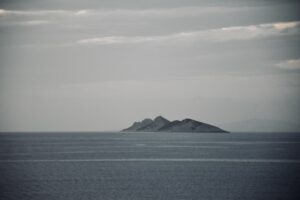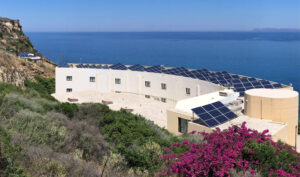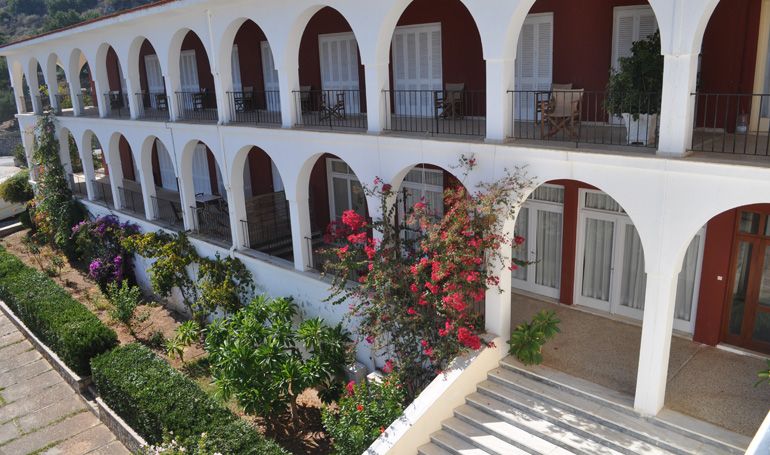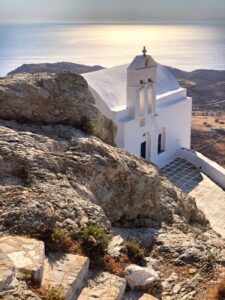Why did last week’s Post arrive on Thursday instead of Friday? (I, an Orthodox, have violated a tradition. Forgive me!) Because I poked the “publish” button by mistake, that’s why.
Dear ones: After four weeks trying to deal with the perplexities of American Christianity, I need a break, and I suspect you do, too. .
So let’s escape. What follows is a personal Travelogue, which also tells the beginning of the story of how I became Orthodox.
A Summer Sabbatical
I’m old now, and can’t travel very far anymore. I won’t see Greece again.
But once I did. And then again and again. Here is how it all began.
+++++++++++++++++++++++++
Thirty five years ago? That trip is still so alive to me that it might have been last summer.
I was a middle-aged Episcopalian (Anglican) priest on sabbatical that summer of 1985. After 20 years on the job, my parish Vestry generously gave me the summer off. They could see I needed it, for I was a very demoralized priest. I was a Traditionalist “ancient Church” Christian. By 1985 I felt sure that was no longer possible in the Episcopal Church.(Looking back, I see that I had been trying to be Orthodox outside the Orthodox Church, which can’t be done, but I didn’t know that yet.)
But I loved my congregation and felt responsible for them, and we had kids to get through college. Without forsaking my conscience, I couldn’t see any way forward or any way out. I was feeling desperate, becoming negative and rigid, driving my parish and my family up the wall. God help me, I remember shaking my finger at my people as I preached. Me? A woman said to me, “I just wish we could get the old Father Bill back.” Oh, I did, too. I really needed a change of scene.
So for a month my wife Dianna and I, with our teenagers Jennie and David, traveled western Europe. We searched in vain for family connections in Wales, but were perhaps overly successful with “Uncle” Hermann in Germany. Everywhere my family had ever sneezed: “Ve vill stop und take a picture.” Finally to Rome. Tourist advice: Go to Rome in spring or fall, not in the heat of high summer.
And then… I had long wanted to see Greece. So with Dianna’s approval (what ever possessed her?) there I stood alone at Leonardo da Vinci airport, tears in my eyes, watching my family fly off for home.
But I was going to Greece!
My “Mid-life Fling” begins
I caught a train south out of Roma  Tiburtina. I indulged myself and got a private room, snuggled into my soft bed and fell asleep as the train oh so smoothly (Amtrak, are you listening?) sped south for Brindisi, the ancient Roman port to the East. At 6:30 a.m. a knock on the compartment door: “Here is your cappuccino, sir.” Can life be better than that?
Tiburtina. I indulged myself and got a private room, snuggled into my soft bed and fell asleep as the train oh so smoothly (Amtrak, are you listening?) sped south for Brindisi, the ancient Roman port to the East. At 6:30 a.m. a knock on the compartment door: “Here is your cappuccino, sir.” Can life be better than that?
The scenery had changed. We flew past white villages atop the hills and arrived on time. (Amtrak, are you listening?) After some exploring, I walked to the dock and found the overnight ferry to Greece.
Who but a clergyman would choose this kind of fling? I was on my way to a Church conference on Crete, intended to introduce Americans to Greece and to Greek Orthodoxy.
I had no intention of becoming Orthodox. Well, to be honest, I was curious. Without digging too deeply into it, I thought the Orthodox had it right. I had visited some Orthodox churches and had wondered if maybe after I retired, maybe… but no more than that. And certainly not then.
What I really wanted was Greece. Greece fascinated me. I think it started when I was a teenager. My cousin Don had married a Greek girl, and her parents invited us to their house for Pascha. What was that? I didn’t know. They served us innumerable mysterious Greek goodies, and her father gave me a little (but not too much) ouzo, an anise-flavored Greek aperitif. After that, an indefinable feeling about Greece lingered with me and inexplicably became stronger. We never know how the smallest things may change the course of our lives, do we?
Back to the ferry: I had intended to spend the night in a seat on deck – until I took one look at the rickety seats. So I went down below to see if I could get a room. “Yes, mister, no problem.” “How much?” He said 350 drachmas or something like that. It sounded like a small fortune. I asked “How much in US dollars?” He said “$10”. I stared at him. A private room for 10 bucks?! He said “Too much?” Before I could think I blurted out “No. Too little!” Now was his turn to stare at me: Another crazy American. I gave him $10 quickly and took the room.
 Next morning I looked out the porthole of my little room and saw in the distance, through the mists of early dawn, the grey outlines of the first Greek islands, and I thought “That’s it. This is my place.” How did I know that? I have no idea. I can’t explain it. It just “was”. And still is.
Next morning I looked out the porthole of my little room and saw in the distance, through the mists of early dawn, the grey outlines of the first Greek islands, and I thought “That’s it. This is my place.” How did I know that? I have no idea. I can’t explain it. It just “was”. And still is.
I’d had experiences like that before. Now, please understand: I’m not some glassy-eyed mystic who floats around receiving indecipherable messages from wherever. But once in a great while I have suddenly just “known” certain things, things which have remained part of me for the rest of my life. For example, the first time my parents and I drove over the border into Wisconsin, I knew Wisconsin is the right place for me. I have lived in Wisconsin for 52 years now; every time I tried to leave, something prevented it. A few other things have “hit” me like this: The Reality of God. That I should be ordained. That Jesus loves me. And my wife! On our first date I knew she was “the one”, and 53 years later she still is. I’ve never had a doubt.
And now Greece. It felt that same way as I looked out the porthole that early morning. Greece also is my place. On my trips over the years, every time the airplane descended into Athens, that chaotic, noisy, if-I’ve-got-to-be-honest-with-you-not-very-beautiful metropolis, I felt it again. “I’m home.” But then again when the airplane descended into Milwaukee: “I’m home again.” My life since 1985 has been torn between two places. When I was in Greece, I missed Wisconsin. When I’m here, I miss Greece. Like right now. It’s a wonderful terrible blessing.
Greece
We docked in Patras, the western port of Greece, and I boarded a little train for Athens which was, well… Amtrak, I take it all back. You’re a lot better than that! I was discovering that Greece in 1985 was in some ways still almost third world. We climbed high with cliffs beside us on the left, the sea far far below to the right. The train bounced and lurched so much that I thought surely it would plunge over the edge and kill us all. It didn’t.
It was a very short distance from the rail station to the hotel. I could see the taxi drivers conspiring: an American! “$15, mister.” “$15, mister.” “$15, mister.” So $15 it was.
I spent one night in a comfortable room in an elegant old world Athens hotel, just off Syntagma Square in the city center, for… $27 a night. Greece in those days was cheap. Next afternoon at the international airport (aerodromeo/αεροδρόμιο if you’d like the Greek) the third world re-emerged. Despite the mid-summer Mediterranean heat, there was no air conditioning, people were sweating, the doors were open, dogs were running about and barking at travelers of whom they disapproved. (May I digress to describe Athens’ present aerodromeo, the most convenient efficient airport I ever came across, and I traveled a good bit.)
It was an hour’s plane ride south to Crete – the Big Island in the middle of the Mediterranean, almost halfway to Africa – and the city of Chania. (No, it’s not pronounced like that. You say HanYA, with a guttural “H” in the back of your throat, and soft “A”s like the Brits say them). The thrill of being 5530 miles away from home! but, on the other hand, 5530 miles away from my family.
The conference was at the Orthodox Academy of Crete, on the Aegean shore in  northwest Crete, next to Gonia Monastery and just outside a small village, Kolymbari. In the far northwest of Crete, (find yourself a map, if you’d like) two uninhabited peninsulas jut out to the north. At the base of the larger one sits the Academy, facing east, just far enough out that you can see ‘way down the north coast of Crete – at night the lights of village after town after village for I don’t know how many miles.
northwest Crete, next to Gonia Monastery and just outside a small village, Kolymbari. In the far northwest of Crete, (find yourself a map, if you’d like) two uninhabited peninsulas jut out to the north. At the base of the larger one sits the Academy, facing east, just far enough out that you can see ‘way down the north coast of Crete – at night the lights of village after town after village for I don’t know how many miles.
 The Academy immediately captivated me: the white buildings, the clean simple open architecture and the rounded arches, the marble floors, all so different from the Western church styles (whether dark medieval or Roman classical or boring modern) I was accustomed to.
The Academy immediately captivated me: the white buildings, the clean simple open architecture and the rounded arches, the marble floors, all so different from the Western church styles (whether dark medieval or Roman classical or boring modern) I was accustomed to.
And the Greek food – moussaka, stuffed peppers, tomatoes and cucumbers such as I had never tasted before. And feta cheese – where had you been all my life? I wish you could just once taste a sweet Cretan watermelon. The Greek word is KarPOUzi. Isn’t that perfect for a big corpulent melon?
And the churches. Everywhere I looked – churches. Greece is covered with churches and chapels. Often, while driving, you can see several at a time. On  many mountaintops are chapels dedicated to the Prophet Elias (Elijah). Once there were temples to the sun god Helios up there. When he was demoted Saint Elias, who was taken up into the heavens in a chariot of fire, fittingly took over. (The Greeks don’t pronounce the “H”, so it’s “Elios” -“Elias”. Easy transition.) Orthodoxy, rather than simply condemning pagan things, used them, “converted” them. I was told that on the feast day of Aghios Elias, July 20, people climb up to the chapels to celebrate Divine Liturgy. Up there? Really?
many mountaintops are chapels dedicated to the Prophet Elias (Elijah). Once there were temples to the sun god Helios up there. When he was demoted Saint Elias, who was taken up into the heavens in a chariot of fire, fittingly took over. (The Greeks don’t pronounce the “H”, so it’s “Elios” -“Elias”. Easy transition.) Orthodoxy, rather than simply condemning pagan things, used them, “converted” them. I was told that on the feast day of Aghios Elias, July 20, people climb up to the chapels to celebrate Divine Liturgy. Up there? Really?
And the sun. Little wonder ancient Greeks worshiped the sun. I was tempted myself. The Light is so brilliant, so indescribably luminous (is that the right word?) that it requires a capital letter. That Light reveals the crags of the bleak rugged Cretan mountains, and the many blue shades of the ever-changing sea, and somehow things many miles away can be seen clearly.
And the smell of the herbs – oregano? thyme? basil? so fragrant they kept me awake at night. As did the mosquitoes. I concluded that mosquito netting is ‘specially designed to let the mosquitos in but not out.
They tried to teach us a little Greek so we could at least say “kalymera / καλή μέρα” (good day) to the villagers. One woman asked why she kept getting such odd looks from the locals as she greeted them saying “καλαμάρι! / calamari!”
Orthodoxy
The conference was led by intelligent, well-educated, well-spoken laypeople, men and women. Many Greek Orthodox theologians and scholars are not ordained. A good thing. Much of Western Christianity is dominated by us clergy.
We Americans came from various backgrounds. We heard many talks and discussed many things, and I found that every time we talked about religion I agreed with the Orthodox, right down the line. It startled me. Orthodox worship at the monastery next door seemed very “unreformed”, ![]() even from my traditional Anglo-Catholic perspective. (Solid icon screens blocking off the altar area – really?) I couldn’t understand the Greek. But still it was so fascinating, so deep, so mysterious, so holy.
even from my traditional Anglo-Catholic perspective. (Solid icon screens blocking off the altar area – really?) I couldn’t understand the Greek. But still it was so fascinating, so deep, so mysterious, so holy.
We were told several times in no uncertain terms – almost as if we were being accused of it – how the Crusaders ravaged the Great City Constantinople, and the East has not forgotten and never will.
We visited churches and ancient pre-Christian sites, even had an audience with the kindly Archbishop of Crete.
We went to a village festival. Now, in Greece there is officially separation of Church and state – well, kind of, sort of, in a way, sometimes. However, there is no separation of Church and life. For example, in Greek towns and villages, the annual festivals {Panigyri / πανηγύρι] are held on the local saint’s day. They begin with Divine Liturgy, then proceed with a huge meal outdoors in the village square, followed by traditional dancing. I remember sitting at table trying hard to eat octopus (ktopodi), as the wine and ouzo flowed freely, while across from me two deacons in their black robes were definitely, shall we say, enjoying themselves.
We did get a little time off. One afternoon I walked to a beach on the far side of the village and was reading. A young Greek widow dressed in black appeared. (Greek widows are easily identified. They always wear black.) I wondered if I should cover up more – till she whipped off her dress, revealing a bright red bikini, and leaped into the water.
An American guy walked along and we got to talking. (How is that Americans can usually spot each other without a word?) He, a military man from a nearby base, said he had not seen his wife for ten months. I told him I hadn’t seen my wife for ten days, and it was almost more than I could handle. And that was the truth.
We visited a little church for Divine Liturgy. The old women, after receiving Holy Communion, stopped and hugged and said a few words to each other. That would have seemed so irreverent in my Episcopal church back home. People would have been shocked, just shocked. But here it seemed right, sweet. (When we started our new Orthodox Mission, even our Anglos quickly began doing the same thing. What is it about Orthodoxy?)
Regarding Orthodoxy, I kept getting that “just right” feeling over and over. Again I couldn’t explain it, but it was there, and it made me very uncomfortable.
The Face
Sometimes we remember things wrong, so I’ve gone back to my daily travel journal. Yes, I remember it right. In the entry for Saturday August 3,1985, I see that in the evening we visited the local Bishop Irenaeos and ate with him and some of his people in the courtyard outside his chapel. He was known for his holiness, and for his social work, defending the poor, speaking up for his people. Once he had been transferred elsewhere, and the people went on strike till they got him back again!
I vividly remember him and his clergy sweetly singing the ancient Orthodox Vespers hymn Phos Hilaron on that lovely summer evening – the love and affection between them.
O joyful Light of the holy glory of the Immortal Father, heavenly, holy, blessed Jesus Christ. Now that we have come to the setting of the sun and behold the light of evening. We praise God: Father, Son, and Holy Spirit. For it is right at all times to worship Thee with voices of praise, O Son of God and Giver of Life. Therefore all the world glorifies Thee. (Third Century)
This is a “Euro-byzant” recording from Karakallou Monastery on Athos, where our Father Barnabas* was. May his memory be eternal. (See Posts 214 and 215 on the right.) We sing the same melody today – in English.
- formerly a member of Saint Nicholas
Here is what I wrote that night after we got back to the Academy: “Wonderful! Such joy! Bishop Irenaeos is a holy man. This is the way the Church should be… don’t forget the Bishop’s face: serene, holy, happy.”
I did not forget that face. I would soon see it again.
Tune in next week.
Next week: Part Two – I fall in love with Orthodoxy
Week after next: The Prayers nobody pays attention to

Excellent talking, Respectful Father!
I’m travelling virtually with continual wonder through your personal experience and witness. Thank you very much!
Father Jeremy, I’m very happy to have you travel along with me!
Father, your blessing!
I have no idea how I haven’t come across your blog until today. This is the first post I’ve read and it was lovely.
Greece was my home for nearly six years. I know exactly what you mean about being in one place and missing the other…
I’m excited to have a read through your many reflections here in this space.
Thank you!
God bless you, Matushka, and thank you.